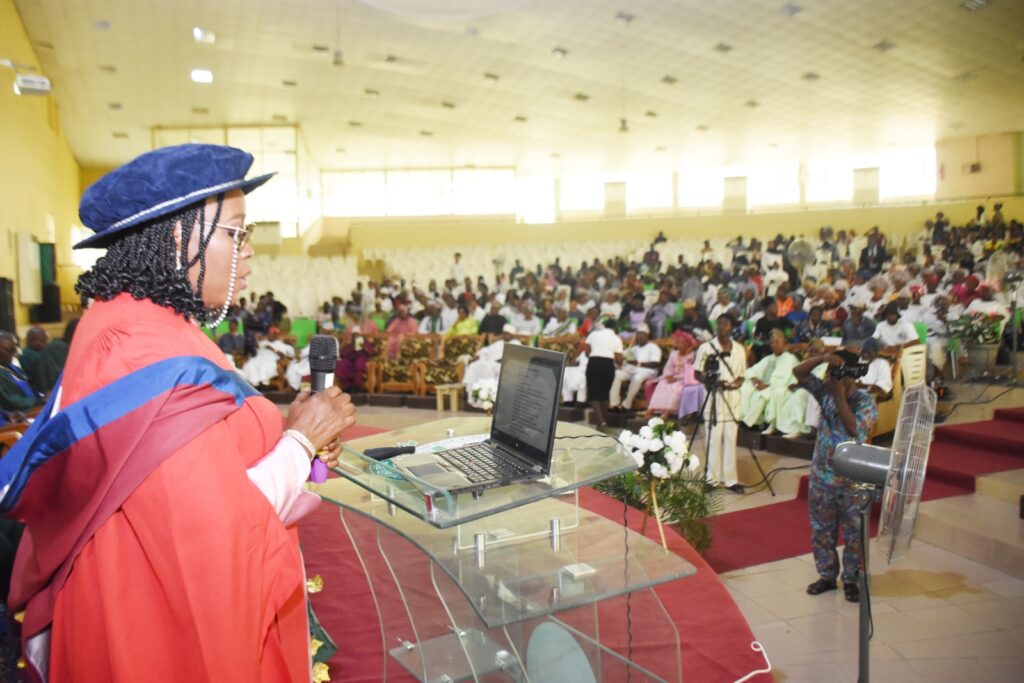Daud Olatunji
In a resounding call to bridge educational disparities, Prof. Grace Sokoya, a distinguished scholar at the Federal University of Agriculture, Abeokuta (FUNAAB), emphasized the urgent need for investment in girl-child education as a powerful strategy to break cycles of poverty and improve psychological well-being across Nigerian families.
Delivering FUNAAB’s 94th Inaugural Lecture on October 30, 2024, Prof. Sokoya highlighted the transformative impact of education on girls, arguing that it equips them to advocate for their rights, make informed decisions, and drive positive societal change.
In her lecture titled, “Afrocentric and Gendered-Constructions of Psychological Well-Being in Families: The Sojourn of a Gender Scholar,” Prof. Sokoya drew attention to the pervasive inequalities hindering educational access for girls, particularly in rural and farm communities.
She urged stakeholders to prioritize girl-child education not only as an investment in individuals but as a critical intervention for community development and poverty alleviation.
“Educated women contribute significantly to family stability and economic progress,” she stated.
“Farm families, especially, require ongoing awareness on the importance of educating girls, as it leads to better health, economic, and social outcomes,” Prof. Sokoya remarked, encouraging Agricultural Extension workers to incorporate this message into their outreach initiatives.
Prof. Sokoya, a globally respected expert in Gender and Family Studies, advocated for increased support for the Agricultural Media Resources and Extension Centre (AMREC) at FUNAAB. She called for gender-sensitive approaches in agricultural extension programs to challenge entrenched stereotypes and promote shared decision-making within farm households, ultimately enhancing family well-being.
The scholar further called for a unified approach involving the government and NGOs to empower women and youths through skills development, culturally relevant education, and micro-financing.
“A collaborative focus on economic independence for women can uplift families and reduce societal inequalities,” she asserted.
Highlighting the unique mental health challenges faced by women, Prof. Sokoya urged them to seek healthy coping mechanisms and openly address mental health concerns.
“Women often internalize stress, leading to higher risks of depression and anxiety. Storytelling, rest, and balanced nutrition are vital for mental wellness,” she advised, emphasizing the therapeutic power of shared narratives and support systems.
In addition, Prof. Sokoya underscored the importance of raising boys with values of empathy, responsibility, and respect toward women, addressing societal imbalances in gender expectations.
“Communities must equally focus on nurturing boys to become compassionate partners and responsible fathers,” she stated, urging intentional parenting as a tool for social transformation.
Commending her impactful work, FUNAAB Vice-Chancellor Prof. Babatunde Kehinde, represented by Deputy Vice-Chancellor (Academic), Prof. Olukayode Akinyemi, praised Prof. Sokoya’s extensive contributions to gender policy and youth empowerment, both at FUNAAB and through her involvement with the Family Resources and Youth Foundation (FRYFOUND) International.
Through her advocacy, Prof. Sokoya continues to champion the importance of girl-child education and inclusive gender policies, leaving a lasting legacy in the pursuit of equity, mental health, and sustainable development in Nigerian communities.
Do you want to share a story with us? Do you want to advertise with us? Do you need publicity for a product, service, or event? Contact us on WhatsApp +2348183319097 Email: platformtimes@gmail.com
We are committed to impactful investigative journalism for human interest and social justice. Your donation will help us tell more stories. Kindly donate any amount HERE




